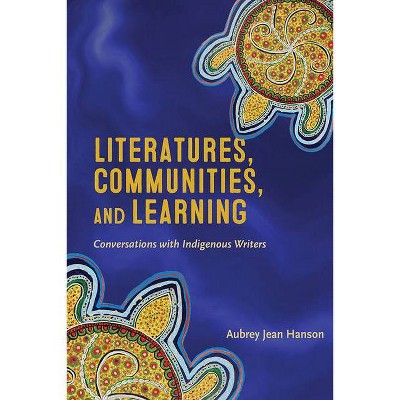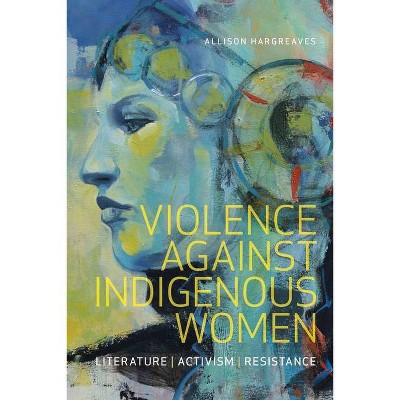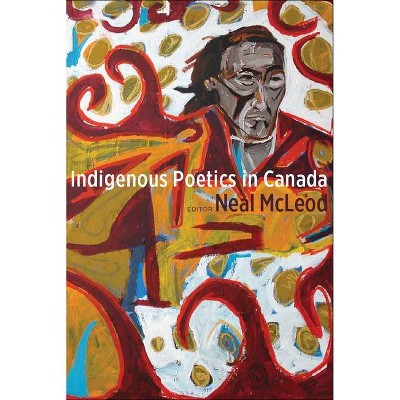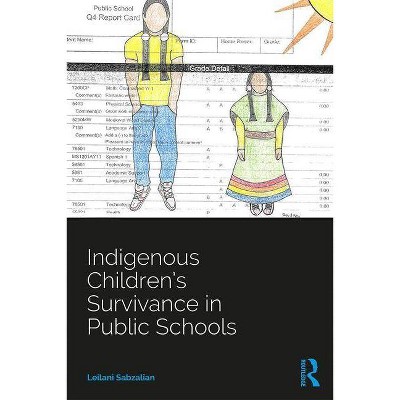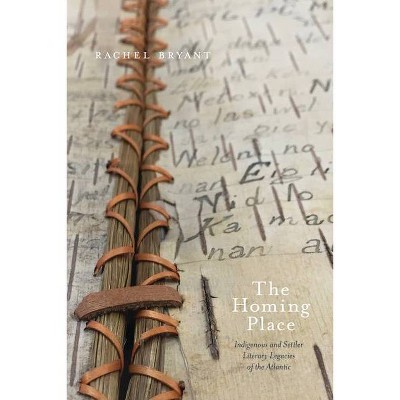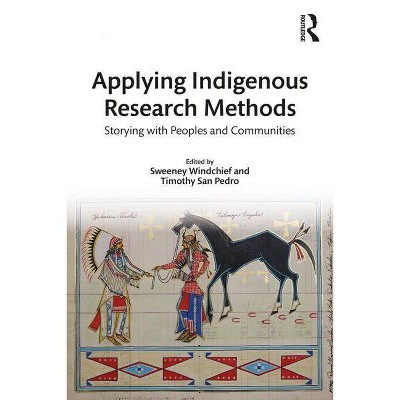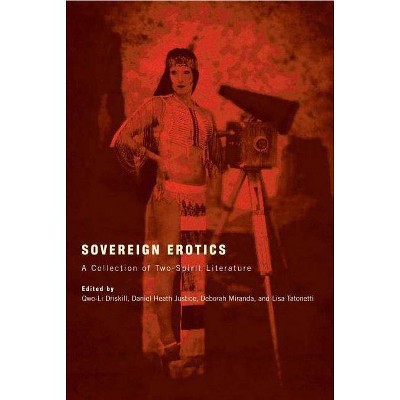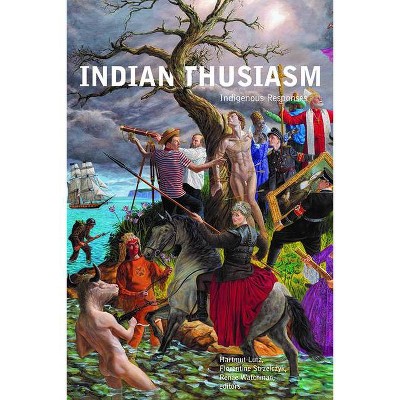Why Indigenous Literatures Matter - (Indigenous Studies) by Daniel Heath Justice (Paperback)
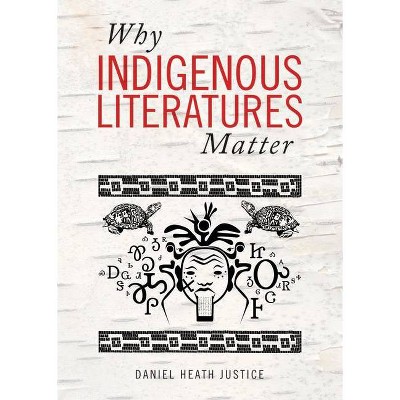
Similar Products
Products of same category from the store
AllProduct info
<p/><br></br><p><b> About the Book </b></p></br></br>Asserts the vital significance of literary expression to the political, creative, and intellectual efforts of Indigenous peoples. Challenges readers to critically consider & rethink assumptions about Indigenous literature, history, and politics, never forgetting the emotional connections of our shared humanity & the transformative power of story.<p/><br></br><p><b> Book Synopsis </b></p></br></br>Asserts the vital significance of literary expression to the political, creative, and intellectual efforts of Indigenous peoples. Challenges readers to critically consider & rethink assumptions about Indigenous literature, history, and politics, never forgetting the emotional connections of our shared humanity & the transformative power of story.<p/><br></br><p><b> Review Quotes </b></p></br></br><br><p>The fact that Justice writes on the matter of why Indigenous literatures matter in an analytically clear and intellectually generous, compassionate, and inclusive manner, always making clear how and why they do so to him, might make it easier for readers less familiar with Indigenous writing, history, and culture to consider the significance of Indigenous literatures to them personally, even if the possibility did not occur to them before. The book ends with an appendix that makes a case for the richness of Indigenous literatures in a more encyclopedic fashion and provides an excellent starting point to explore more Native writing. . .. In a time where the question about the existence and worth of Indigenous literatures still has not ended, [<i>Why Indigenous Literatures Matter]</i> now stands as the number one recommendation to anyone asking this question.</p> -<b>Rene Dietrich, <i>Transmotion</i></b><br><br><p>This book simultaneously affirms Indigenous writing, introduces Indigenous readers to the canon of Indigenous writing, and teaches non-Indigenous folks how to read our literatures. That's impressive, and it's done in a beautiful, intimate and at times playful way. <i>Why Indigenous Literatures Matter</i> was an honor to read. It is instructional without instructing, grounded, confident, affirming, generous, brilliant, clear and joyful.</p> -<b>Leanne Betasamosake Simpson, author of <i>As We Have Always Done</i> and <i>This Accident of Being Lost</i></b><br><br><p>[. ..] this compelling book offers a point of entry into the field of Indigenous literary studies to new readers as well as a better, more expansive, understanding of the field for scholars..</p> -<b>Janie Beriault, <i>The Canadian Journal of Native Studies</b></i><br><br><p>A seminal work of simply outstanding scholarship, <i>Why Indigenous Literatures Matter</i> is as impressively informed and informative as it is thoughtful and thought-provoking</p> -<b>Jack Mason, <i>Midwest Book Review</i></b><br><br><p>Concise, engaging and readable, Why Indigenous Literatures Matter evokes Indigenous frameworks of relationality at every turn, whether the history of dispossession and removal, or pressing contemporary issues like reconciliation and climate change. Ultimately, this book argues that Indigenous literatures matter because they transform lives. The last chapter, 'Reading the Ruptures, ' is startling, moving, brilliant storytelling--troubling and transformative tribalography, laced with humour, provocation, and insight. The characters, drawn from real life, are ones I want to travel with.</p> -<b>Lisa Brooks, Amherst College, author of <i>Our Beloved Kin: A New History of King Philip's War</i></b><br><br><p>Daniel Heath Justice's <i>Why Indigenous Literatures Matter</i> tackles the significant task of illuminating the heart of Indigenous literary engagement, articulating the significance of the literary arts to Indigenous peoples. While politically impactful and theoretically cogent, Justice's book is simultaneously tender and personal. While owning his feelings and experiences, Justice comes out swinging against the systems that exacerbate and perpetuate the misrepresentation and erasure of Indigenous stories--but not by positing himself as a pure critical voice above the messiness of mutually complex relationships. Through this fertile approach to his questions, Justice opens up space for collective engagement around the significance of Indigenous literatures to Indigenous peoples.</p> -<b>Aubrey Hanson, <i>Canadian Literature</i></b><br><br><p>In <i>Why Indigenous Literatures Matter</i>, Daniel Justice, a writer and scholar from the Cherokee Nation, points out the all-too-common disparity between the stories Indigenous writers tell about ourselves, and the stories others have told about us. . .. [Justice is] a bridge builder between cultures.</p> -<b>Carleigh Baker, <i>Literary Review of Canada</i></b><br><br><p>Justice has created a wonderwork of his own in Why Indigenous Literatures Matter; it is a text that I will read, teach, and share with students, fellow scholars, friends, and relatives because it demonstrates with such clarity and conviction why Indigenous peoples matter and why that fact should be celebrated [. ..]</p> -<b>Jennifer Andrews, <i>The Fiddlehead</i></b><br><br><p>Justice makes strong, well-reasoned arguments that indigenous liberation is essential for indigenous peoples to survive and recover from colonialism...and offers erudite, passionate analysis of and paths toward discovering new material.</p> -<i><b>Publishers Weekly</i></b><br>
Price History
Cheapest price in the interval: 15.69 on October 22, 2021
Most expensive price in the interval: 15.69 on November 8, 2021
Price Archive shows prices from various stores, lets you see history and find the cheapest. There is no actual sale on the website. For all support, inquiry and suggestion messagescommunication@pricearchive.us
